It’s too darn hot over at NextStop Theatre Company! They’re shaking up the sizzling end of summer and going out with a big bang as they bring Cole Porter’s Kiss Me, Kate to the stage. One final summer hoorah falls perfectly into place in the intimate black box space under the Direction of Michael Bobbitt and Musical Direction of Steve Przybyiski. This zesty zinger of a show-stopping feel-good comedy, with Porter’s music and lyrics and a Book by Bella and Samuel Spewack, is dazzling like dynamite with incredibly talented performers, stylized era-appropriate dance routines, and an energy that drives the show through to its zany conclusion. A spectacular way to end the vacation season, NextStop is pulling out all the stops for this production.
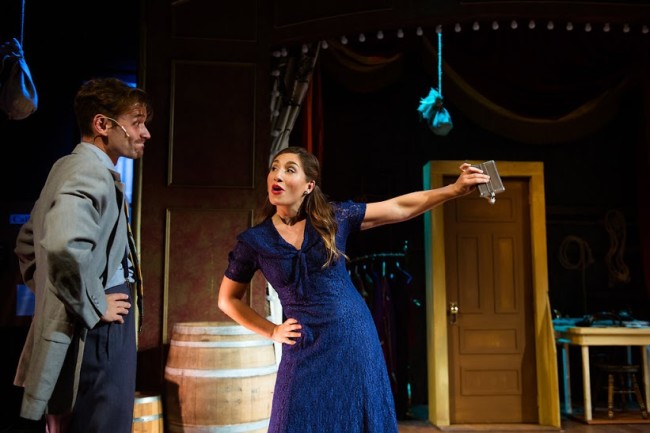
Transforming an intimate black box space is no easy task, especially not when the authenticity of the play space becomes an inherent part of the show’s existence. Scenic Designer Elizabeth McFadden creates a classic 1940’s backstage and ‘front of house’ performance playground for the production that is every bit as detail-oriented as it is true to period. The sandbag-weighted pulley ropes that ascend into the ‘fly space’ in addition to the intricately printed call-board near the back stage exit are all the finely crafted touches of minutia that McFadden has included in her design work. The fanciful old-fashioned blinking big bulbs that border the proscenium of the player’s stage (added to functionality by Lighting Designer Max Doolittle) speak of theatrical yesteryore with vim.
The show’s Costume Designer, Kristina Martin, has a strong knack for period pieces, understanding the styles of classy 1940’s while simultaneously interspersing the show’s meta-play experience of “traditional Shakespeare” into her working repertoire. While the cast spends a good deal of time in their Taming of the Shrew costumes, which are perfectly poufy and accented to fit the Bard’s era, Martin’s design work for the 1940’s costumes is simply swell. Her costumes of 1940’s noteworthy praise include the blaring red outfit reserved for Harrison Howell, which is nearly as loud as his arrival and personality, and the pristine prim and proper outfits that match the diva ego of Miss Lilli Vanessi.
Director Michael Bobbitt finds the truth of the story among the comedic plot twists and this is what makes for a successful production. Numbers like “We Open in Venice,” are played straight through with increasing energy as they roll through the verses. This approach delivers amazing entertainment and sincerity behind what’s happening in the play-within-a-play. Bobbitt mines the production for its emotions and intertwines them with the moments of lively action, sprightly comedy, and simmering romance. His use of the entire theatrical space, and not just the stage, creates an all-inclusive atmosphere and makes the moments where the characters break through the fourth wall feel natural. Bobbitt’s decision to place the orchestra on stage is a brilliant one. Not only does it create the effect that they are in a sense part of the play and the meta-play but it gives the actors an opportunity to interact with them, furthering the inclusive atmosphere of the show.
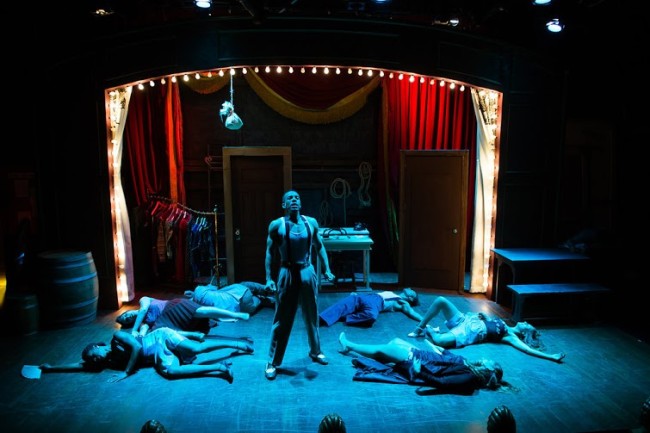
The opening note of “Another Openin’ Another Show” is a pristine echo of the caliber of talent the audience can expect throughout the performance. With a slow smoldering start, the number quickly gains ground and tempo and charges its way into dazlious showmanship with full energy reverberating through the 11-person cast. Daphne Epps gets her quick flash in the spotlight during this number, bringing her sensational voice to the bar during this song, along with robust opening note-singer Bobby Libby. This, as well as other company number like “Too Darn Hot” feature the fully energetic enthusiasm of the ensemble. Hasani Allen shows off his impressive pipes and fancy footwork during the aforementioned number as well. This trio of featured ensemble members gives the performance their all, making for one swell show among the ensemble.
Choreographer Rachel Dolan brings simplicity to the stage by refusing to overcomplicate the dance routines in this production. Cole Porter’s vibrant music runs the risk of being flashy and loaded with superfluous spectacle in the dance department, but Dolan shies away from this approach with crisp, clean-cut slide-step routines that speak to the time, the style of the music, and the movers of the performance. That is not to say Dolan’s routines are without their entertaining merit and aesthetic pleasures. Watching Hasani Allen as Paul twirl and whirl about during “Too Darn Hot” and the nod to old Vaudeville that surfaces between the gangsters during “Brush Up Your Shakespeare” speaks volumes of Dolan’s creative and artful efforts in the production.
Taking on dual characters as nearly every principal does in this performance, Bobby Libby crafts a wildly entertaining Baptista and juxtaposes that physically hilarious character against an uproariously entertaining rendition of Harrison Howell, whose arrival in the second act shakes things up with proper southern gentility. Libby articulates his presence on stage with strongly defined physicality for Baptista, creating a caricature of the character’s hunched figure and crippled gait while he uses a thick southern drawl and deliberately languid cadence to define Howell.
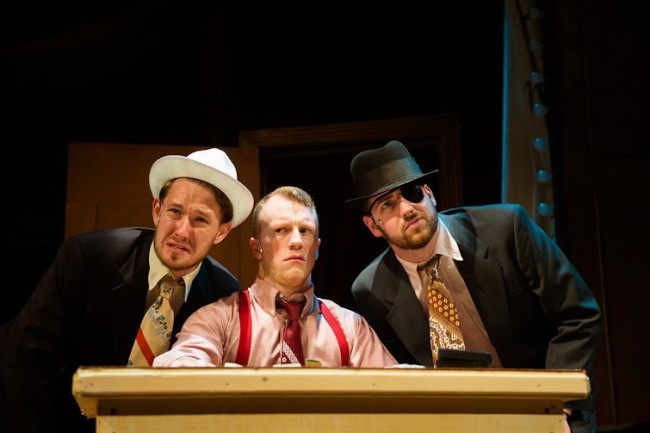
Scene-stealing mobsters Kevin Place and Drew Stairs, listed only as ‘Gangster 1 & 2’ set the stage ablaze with their comedic antics whether it’s their overly exaggerated and affected accents and vocal deliveries of speech or their utterly hysterical physical comedy that flirts lightly with the borders of slapstick once the gangsters find themselves in the production of Shrew, both Place and Stairs have unearthed their comic niche in the performance, doing so with earnest truth in their overall character delivery. The show-stealing number, “Brush Up Your Shakespeare” sees Place and Stairs delivering the epitome of comic campiness, the result of which is uproarious laughter and thunderous applause from the audience.
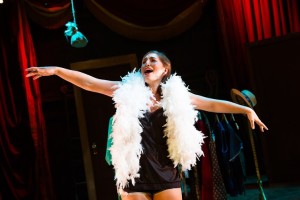
Bill Calhoun (Stephen Russell Murray) and Lois Lane (Emily Levey) are the Nathan and Adelaide of their time, a real swell guy-and-doll couple that like all guy-and-doll couples have their troubles, mostly because of the gambling and the jealousy. Murray looks the part of the slick gambler turned stage man, as does Levey in her demure but flirtatious fashion. Delivering a multifaceted and deliciously dynamic character in Lois, Levey unloads her frustrations soundly in “Why Can’t You Behave?” This particular number allows her vocals to resonate like a lounge singer resting in a speak-easy. Saucing up the precious ingénue character with sizzling spice, Levey layers on the sensual charm for “Always True to You” later in Act II. Brassy, sassy, and jazzy, Levey showcases her mixed belting ability and really wows the crowd with her ability to play with the brilliantly penned lyrics herein.
Murray, as the troubled Calhoun, finds his own ways to impress upon the stage in both song and dance. While his chemistry with Levey’s character is a perpetual roller coaster of up and down enchantment, his overall stage presence is consistent, delivered with solidarity and firm integrity. Showcasing his vocal abilities in “Tom, Dick, or Harry”, Murray shows off with Gremio (Drew Stairs) and Hortensio (Hasani Allen) in this number all in the name of love. But it’s his rendition of “Bianca” that gives the audience a glimpse inside of what drives the character, and Murray’s voice delivers with emotional integrity from the start of the number to the end.
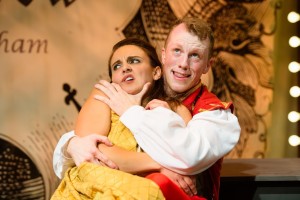
He’s come to wive it wealthily in Padua, this Fred Graham (Paul Scanlan) with an ego a mile wide and the talent to support the ego. Scanlan is a sensational match to the role of Fred Graham, who becomes Petruchio in Shrew. Scanlan delivers a superb rendition of “I’ve Come to Wive it Wealthy in Padua” with a flawless blend of patter and ballad the slide seamlessly in and out of one another. His robust roar of a sound announces his presence for the number and settles into the classical feel of the piece. Comic antics know no bounds when he tackles “Where is the Life that Late I Led?” his facial expressions flourishing with exasperation to match the melodramatic sentiment of the song. Scanlan unearths a raw emotional sincerity in Fred Graham as well, first in “Were Thine that Special Face” alighting upon the notes in earnest. This same emotional expressivity reveals itself in Scanlan’s rendition of “So in Love I Am (Reprise.)” His heartfelt realizations for Lilli Vanessi (Karen Vincent) arise to the surface of every raw note.
Vincent and Scanlan are the epitome of caustic and volatile lovers upon the stage. Their one moment of reconciliatory peace is achieved early on in the production during the duet, “Wunderbar” which is as the title of the song suggests. The pair drift into the sprightly melody of the song as if their characters had never separated and their love had never soured, flitting gaily about her dressing room with happiness populating their lyrics as they sing in harmony with one another. This moment creates the perfect juxtaposition for the rest of their time shared on the stage, which is spent in bombastic blasts of discord trying to obliterate the other emotionally, verbally and physically. Their chaotic and passionate violent streaks play exceptionally well off one another and the tight-knit fight choreography between them is sensational.
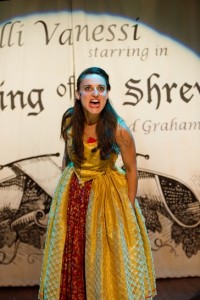
Karen Vincent is the epitome of ‘the shrew’ in this production. Both as Lilli Vanessi in her haughty and diva nature, as well as when playing the irate Kate in Shrew. With a pristine operatic voice, Vincent delivers stunning vocal approaches to her various solo numbers throughout the performance. “So in Love am I” is a wistful and nostalgic delivery of forlorn love that exposes a vulnerable side to the Vanessi character and simultaneously showcases Vincent’s vocal range and prowess. Her seething fits of rage both in the meta-play and the actual play are comic genius and timed to perfection, creating a true vicious viper in the character especially as Kate. Thundering the house down with her rendition of “I Hate Men” Vincent is a veritable fuming volcano of loathing in this solo. With hyper animated facial expressions of disgust and crazy eyes that could easily terrify the bravest of knights, Vincent rolls like an enraged rogue through this song, and even finds a moment to display her extreme soprano sound while playing with the number to make it uniquely her own at the end. A stellar shrew giving a dynamic portrayal if ever there was one, Karen Vincent is the perfect actress for the title role of this show.
A brilliant evening of theatre that will have you laughing and thoroughly enjoying every blessed minute of the show, Kiss Me, Kate, at NextStop Theatre Company is the perfect way to close out your summer season of theatergoing.
Running Time: Approximately 2 hours and 40 minutes with one intermission
Kiss Me, Kate plays through September 13, 2015 at NextStop Theatre Company— 269 Sunset Park Drive in Herndon, VA. Tickets can be purchased at the door or in advance online.

